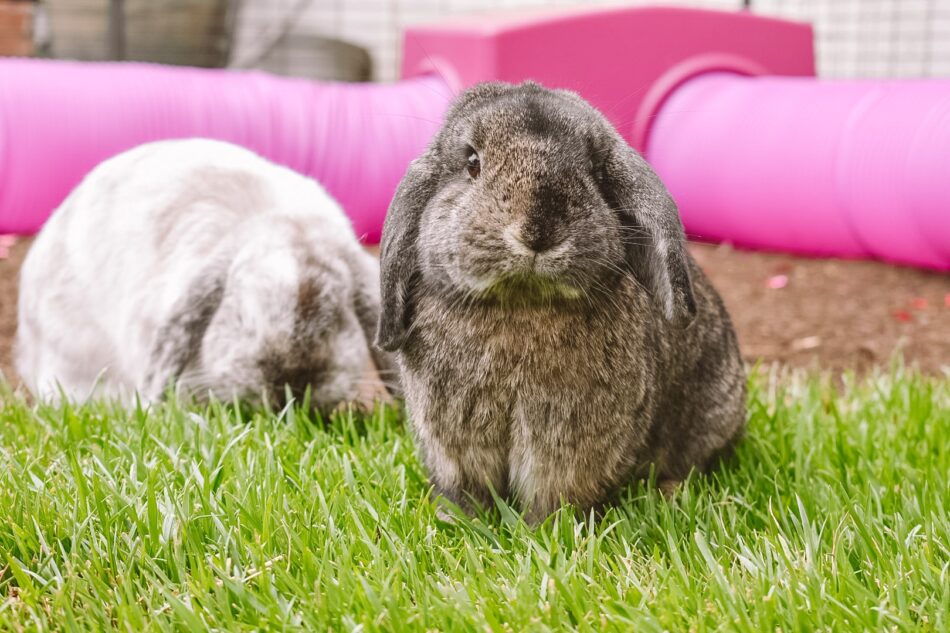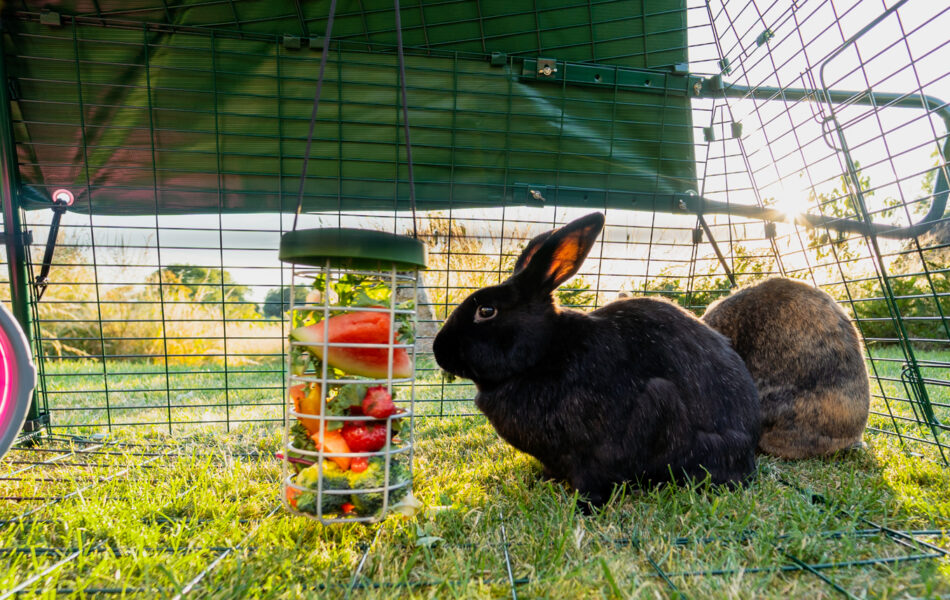Gardening with rabbits
Rabbits are often the villains in gardening tales — both in fiction and first-hand accounts. But with just some minor modifications, bunnies can actually be beneficial to gardens. We’re here to set the record straight: gardening with rabbits is both possible and enjoyable with the right setup and know-how.
Bunnies and gardens: how to keep both
The beloved tale of Peter Rabbit by Beatrix Potter paints a pretty bleak picture of life with rabbits in gardens. Both Mr. McGregor’s plants and person were afflicted by the endearing mischief-making Peter. This story, along with many others, have earned rabbits quite the reputation for being garden menaces.
While it’s true that — when left to their own devices — rabbits will happily nibble, gnaw, and devour a number of garden plants, they’re merely acting out of instinct. Here’s how to keep your bunnies alongside your garden without risking your prized blooms and buds.
Setup for success
Rabbits need their own space in or around the garden to keep them from sampling (or decimating) its contents. And, plants should be placed in elevated containers or garden beds to prevent rabbits — both wild and domestic — from reaching them. If a plant is within reach of your rabbits, it’s fair game.
Strategically placing your rabbit hutch and run in proximity to your garden will help you reap the benefits of bunnies — or more specifically, their droppings. Rabbit manure is gardening gold, and can be added directly to plants without needing to be composted first.
Rabbits can also eat potential unwanted plants in the garden like dandelions or clover, and with wheels and handles for your rabbit hutch, you can move their home around to direct their weed-eating services. You can also create separate areas by using Zippi Rabbit Tunnels and Playpens to target specific areas that are prone to overgrowth.
Plant with purpose
Deciding what type of garden you want to have will help you choose the plants you incorporate. Some plants are naturally more appetizing to rabbits than others, while others have odors or textures that rabbits may find off putting. You can grow healthy snacks and treats in a rabbit-friendly garden, or you can plant vegetation that doesn’t appeal to bunnies — avoiding drawing their attention altogether.
Rabbit-friendly garden options
- Arugula
- Asters
- Bell Pepper
- Carnations
- Carrots
- Geraniums
- Greens (mustard, turnip, etc.)
- Herbs (basil, cilantro, dill, parsley, rosemary — to name a few)
- Hibiscus
- Lettuce (the darker the variety, the more nutritious)
- Marigolds
- Nasturtium
- Pansies
- Roses
- Squash
- Sunflowers
Rabbits will happily consume any of these plants, so you’ll want to keep them in elevated containers or partitioned away from your bunnies to prevent them from overeating. Fresh garden offerings should not make up more than 10% of your rabbit’s diet.
Rabbit-resistant plants
Some plants just aren’t appealing to rabbits. While technically safe for them to eat, rabbit-resistant plants usually have a strong fragrance, or have thick stalks or leaves that aren’t palatable to bunnies. They include:
- Alyssum
- Bee balm
- Butterfly Bush
- Catmint
- Lavender
- Salvia
- Snapdragons
These plants aren’t guaranteed to deter rabbits, but in general they don’t seem to be appealing snacking options. It should also be noted that some of these plants are only off putting during their flowering seasons due to their fragrance.
Plants toxic to rabbits
It’s also important to note that some plants are toxic to rabbits and should be omitted from your garden. Here’s a list of common garden plants that are toxic to rabbits:
- Azaleas
- Blue Bells
- Brugmansia (Angel Trumpet)
- Buttercups
- Coleus
- Columbines
- Daffodils
- Dahlias
- Foxgloves
- Hemlocks
- Holly
- Hyacinths
- Irises
- Ivy
- Lupines
- Lily of the Valley
- Milkweed
- Mistletoe
- Nightshades
- Poppies
- Primroses
- Rhodendrons
- Tulips
- Wisteria
- Yew
This list isn’t exhaustive, so it’s always a good idea to research all plants that are currently in your garden or that you’re considering bringing home to make sure they aren’t toxic to your rabbits. The effects of these plants range from digestive upset to neurological impacts and even death, so it’s important to contact your veterinarian if you think your rabbit has ingested a toxic plant.
Friendly fertilizers
Rabbits like to dig and scratch in the earth, so the soil around their setup should be free of harmful chemicals and substances. Keep any top soil or water runoff free from commercial fertilizers, weed killers, or insecticides around your bunnies.
There are rabbit-friendly options to help keep your garden looking great — and one of these options comes directly from your bunnies themselves. Rabbit manure is an excellent cold-fertilizer (meaning it does not need to be composted first) that can be added directly to your plants in its natural form, or through a “tea”. Compost is also safe to use around rabbits, just make sure that it’s been fully composted.
Weed control may also be of concern in your garden, and some weeds aren’t safe or palatable for rabbits. You can make these rabbit-safe weed killers:
- Vinegar, dish soap, and salt
- Rubbing alcohol and water
- Boiling water
Avoid direct contact with these and your rabbits, and allow them to fully dry before allowing your bunnies back into the area.
Omlet and your rabbits
With the right setup, your bunnies can happily help you keep your garden looking beautiful. The Eglu Go Rabbit Hutch is designed to keep your pets comfortable and protected all year round so that they can enjoy the garden alongside you. And with added wheels and handles, you can easily move your bunnies to better grazing areas. Explore all of our rabbit products and discover how easy and enjoyable it can be to combine your favorite hobbies.
This entry was posted in Rabbits


